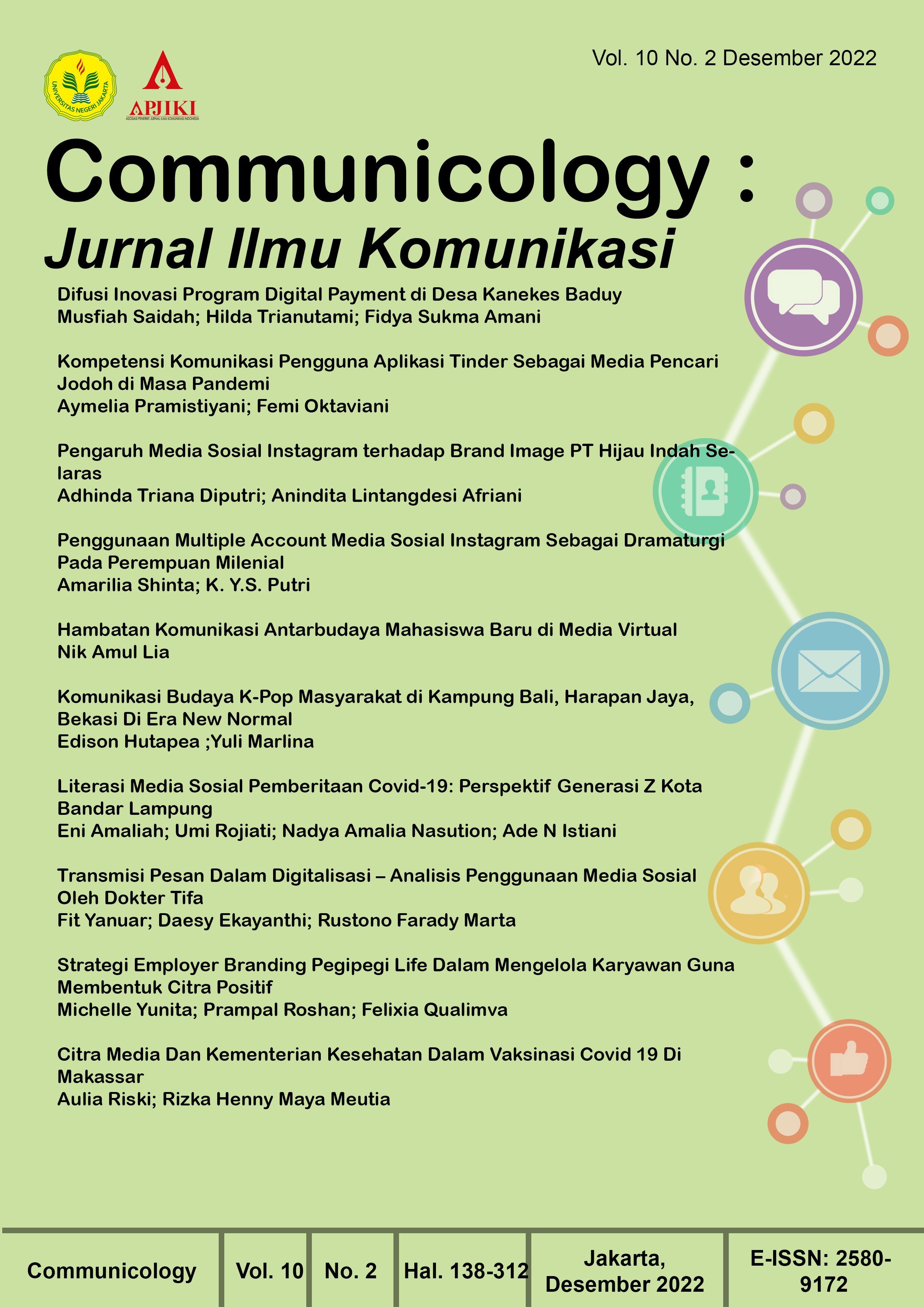Kompetensi Komunikasi Pengguna Aplikasi Tinder Sebagai Media Pencari Jodoh di Masa Pandemic
DOI:
https://doi.org/10.21009/COMMUNICOLOGY.030.02Kata Kunci:
Tinder Application, Communication Competenc, Interpersonal Communication, TrustAbstrak
This research is based on the communication competence of Tinder application users. Tinder application as an alternative media in finding a mate during the pandemic. Communication competence or a person's ability to communicate will build a trust in an ongoing relationship, even though this communication only takes place through chat media, it does not hinder the communication undertaken. The foundation in this research is interpersonal communication, interpersonal communication is considered the most effective in changing attitudes, beliefs, opinions and behavior of the communicant. The theory used in this research is Social Penetration Theory. The method used in this research is the researcher uses a qualitative approach with the case study method, the data collection technique in this study is in-depth interviews with Tinder application users. The results of this study that the communication competence of Tinder application users can be seen from how Tinder application users manage emotions in chat rooms, determine message content in responding to chats, and build interpersonal relationships through chat media. From these findings it can be concluded that a relationship can be built from a trust. Trust in communication using Tinder arises because of communication skills in the form of expressions, responses, and personal behavior and clear interpersonal information exchange.
Referensi
Ahmad, E. N. (2021). Diferensiasi Produk Sebagai Strategi Komunikasi Pemasaran pada Lahan Pemakaman Firdaus Memorial Park. 3(26), 1–15.
Arafat, G. (2018). Membongkar Isi Pesan dan Media dengan Content Analysis Gusti Yasser Arafat UIN Antasari Banjarmasin. Jurnal Alhadrah, 17(33), 32–48.
Badawi, M. A., & Rahadi, D. R. (2021). Analisis Komunikasi Interpersonal Antar Mahasiswa President University. 9(1), 126–140.
Dewi, N. R., & Sudhana, H. (2013). Hubungan Antara Komunikasi Interpersonal Pasutri dengan Keharmonisan dalam Pernikahan. Jurnal Psikologi Udayana, 1(1), 22–30. https://doi.org/10.24843/jpu.2013.v01.i01.p03
Fataraya, D. (2018). Pengelolaan Hubungan Antarpribadi Pada Pasangan Berpacaran. E-Journal Undip, 6(3), 35–44.
Hanif Herdianti, A. (2017). “PENCARIAN JODOH MELALUI APLIKASI TINDER DI ERA DIGITAL” (Studi Tentang Pencarian Jodoh Pada Perempuan) Disusun oleh.
J.Moleong, L. (2018). Metodologi Penelitian Kualitatif (revisi). Rosda Karya.
Lestari, S. B. (2007). Kompetensi Komunikasi Antar Pribadi dalam Proses Penguatan Hubungan Suami Istri. Jurnal Ilmu Sosial, 6(2), 42–50.
Mellania, C., & Tjahjawulan, I. (2020). Pencarian Jodoh Daring Masyarakat Urban Indonesia. JSRW (Jurnal Senirupa Warna), 8(1), 19–37. https://doi.org/10.36806/JSRW.
Wulandari, T. (2013). Memahami Pengembangan Hubungan Antarpribadi Melalui Teori Penetrasi Sosial. Majalah Ilmiah UNIKOM, 11(1), 1–122.
Unduhan
Diterbitkan
Cara Mengutip
Terbitan
Bagian
Lisensi
Authors who publish with this Journal agree to the following terms:
- Author retain copyright and grant the journal right of first publication with the work simultaneously licensed under a creative commons attribution licensethat allow others to share the work within an acknowledgement of the work’s authorship and initial publication of this journal.
- Authors are able to enter into separate, additional contractual arrangementfor the non-exclusive distribution of the journal’s published version of the work (e.g. acknowledgement of its initial publication in this journal).
- Authors are permitted and encouraged to post their work online(e.g. in institutional repositories or on their websites) prior to and during the submission process, as it can lead to productive exchanges, as well as earlier and greater citation of published works.
Users/public use of this website will be licensed to CC BY





